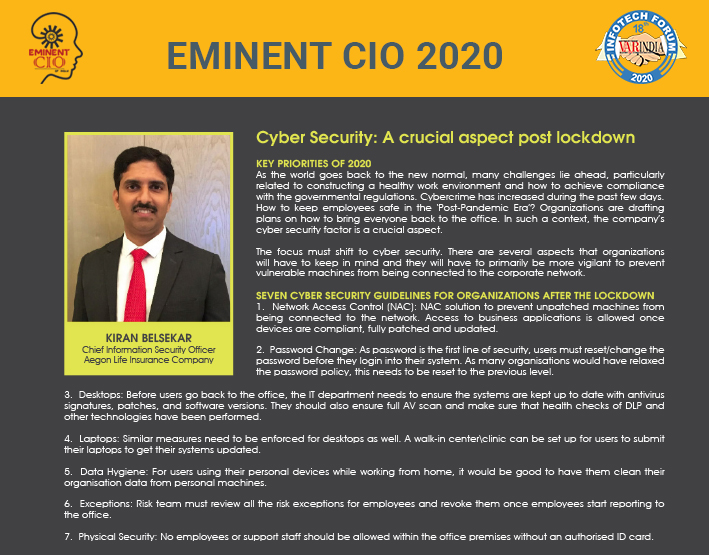Cyber Security: A crucial aspect post lockdown
By MYBRANDBOOK

Kiran Belsekar
Chief Information Security Officer - Aegon Life Insurance Company
Key Priorities of 2020
As the world goes back to the new normal, many challenges lie ahead, particularly related to constructing a healthy work environment and how to achieve compliance with the governmental regulations. Cybercrime has increased during the past few days. How to keep employees safe in the ‘Post-Pandemic Era’? Organizations are drafting plans on how to bring everyone back to the office. In such a context, the company’s cyber security factor is a crucial aspect.
The focus must shift to cyber security. There are several aspects that organizations
will have to keep in mind and they will have to primarily be more vigilant to prevent vulnerable machines from being connected to the corporate network.
Seven Cyber Security guidelines for Organizations after the Lockdown
1. Network Access Control (NAC): NAC solution to prevent unpatched machines from being connected to the network. Access to business applications is allowed once devices are compliant, fully patched and updated.
2. Password Change: As password is the first line of security, users must reset/change the password before they login into their system. As many organisations would have relaxed the password policy, this needs to be reset to the previous level.
3. Desktops: Before users go back to the office, the IT department needs to ensure the systems are kept up to date with antivirus signatures, patches, and software versions. They should also ensure full AV scan and make sure that health checks of DLP and other technologies have been performed.
4. Laptops: Similar measures need to be enforced for desktops as well. A walk-in center\clinic can be set up for users to submit their laptops to get their systems updated.
5. Data Hygiene: For users using their personal devices while working from home, it would be good to have them clean their organisation data from personal machines.
6. Exceptions: Risk team must review all the risk exceptions for employees and revoke them once employees start reporting to the office.
7. Physical Security: No employees or support staff should be allowed within the office premises without an authorised ID card.



Legal Battle Over IT Act Intensifies Amid Musk’s India Plans
The outcome of the legal dispute between X Corp and the Indian government c...

Wipro inks 10-year deal with Phoenix Group's ReAssure UK worth
The agreement, executed through Wipro and its 100% subsidiary,...

Centre announces that DPDP Rules nearing Finalisation by April
The government seeks to refine the rules for robust data protection, ensuri...

Home Ministry cracks down on PoS agents in digital arrest scam
Digital arrest scams are a growing cybercrime where victims are coerced or ...


Icons Of India : AMIT CHADHA
Amit Chadha serves as the CEO and Managing Director of L&T Technology ...

Icons Of India : NANDAN NILEKANI
Nandan Nilekani is the Co-Founder and Chairman of Infosys Technologies...

Icons Of India : Bhavish Aggarwal
Indian entrepreneur Bhavish Aggarwal is the CEO of Ola, India’s larg...


UIDAI - Unique Identification Authority of India
UIDAI and the Aadhaar system represent a significant milestone in Indi...

GSTN - Goods and Services Tax Network
GSTN provides shared IT infrastructure and service to both central and...

ECIL - Electronics Corporation of India Limited
ECIL is distinguished by its diverse technological capabilities and it...


Indian Tech Talent Excelling The Tech World - Steve Sanghi, Executive Chair, Microchip
Steve Sanghi, the Executive Chair of Microchip Technology, has been a ...

Indian Tech Talent Excelling The Tech World - Aman Bhutani, CEO, GoDaddy
Aman Bhutani, the self-taught techie and CEO of GoDaddy, oversees a co...

Indian Tech Talent Excelling The Tech World - ARVIND KRISHNA, CEO – IBM
Arvind Krishna, an Indian-American business executive, serves as the C...
 of images belongs to the respective copyright holders
of images belongs to the respective copyright holders